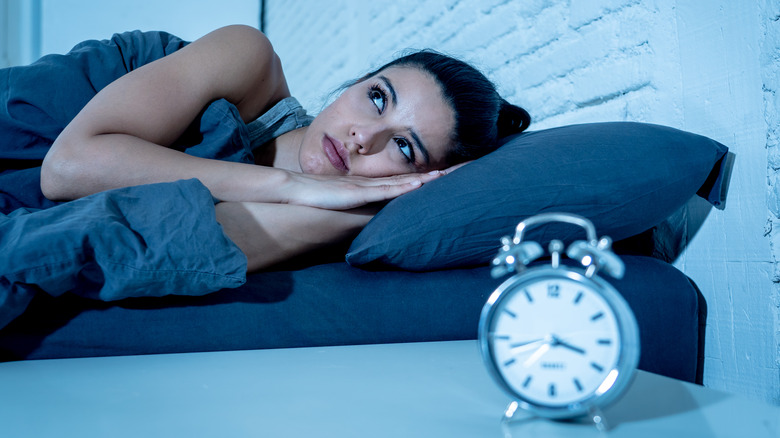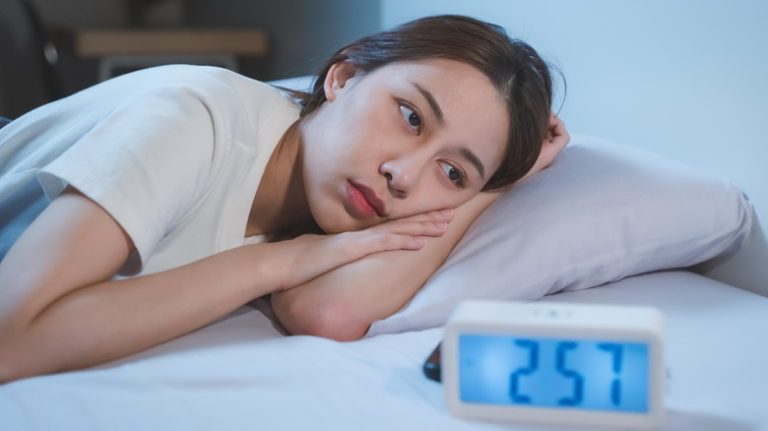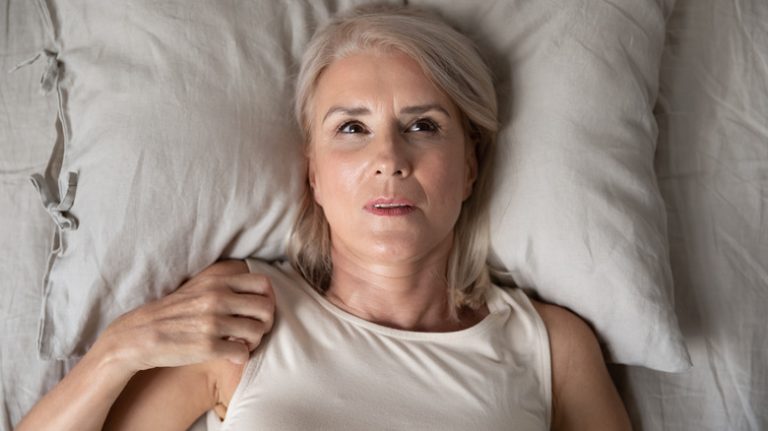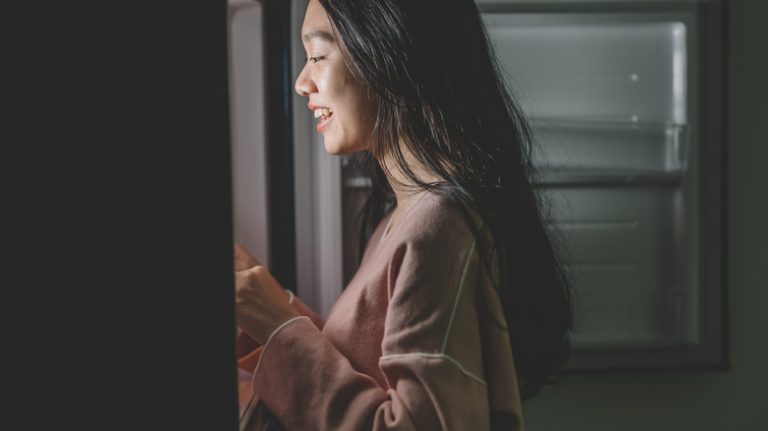There’s a lot going on while you’re sleeping. According to the National Heart, Lung and Blood Institute, sleep affects your heart, your overall metabolism, your respiratory system, and your immune system. Your sleep pattern influences hormones that your body releases, and helps your brain learn and form long-term memories. All of which means that insomnia — difficulty falling asleep and staying asleep — is considered a risk to your health, according the Centers for Disease Control and Prevention (CDC). Yet, our culture seems to consider lack of sleep to be no big deal. Survey data from the National Sleep Foundation (NSF) shows that 40% of adults are so sleepy during the day that it interferes with their daily activities; 62% reported feeling drowsy while driving, and 27% actually dozed off while driving during the past year (via WebMD).
Poor sleep isn’t always due to insomnia. The NSF reports that many people don’t give themselves enough sleep time (adults should get a minimum of seven hours a night per the CDC). But the National Center on Sleep Disorders Research estimates that 70 million Americans suffer from insomnia or another sleep disorder. To find out more about this thief of sleep, read on.
Insomnia affects your whole day

You may think of insomnia as a nighttime problem, but it’s a condition that makes itself known both day and night. The primary symptoms of insomnia do occur after dark. Difficulty falling asleep, difficulty staying asleep through the night, and waking up too early in the morning are hallmarks of insomnia, according to the American Academy of Sleep Medicine (AASM). But there are daytime symptoms as well, and these include fatigue and sleepiness; problems with attention, concentration, or memory; poor performance at school or work; and moodiness or irritability.
Studies have found that insomnia can impair your decision-making ability and harm your relationships. It makes other medical conditions harder to handle, and reduces your overall quality of life. Sleep is as important to your health as good nutrition and exercise, notes the AASM. Adults should get seven hours of sleep or more per night on a regular basis; if you’re not, it’s a problem that should be addressed.
Insomnia is a common problem
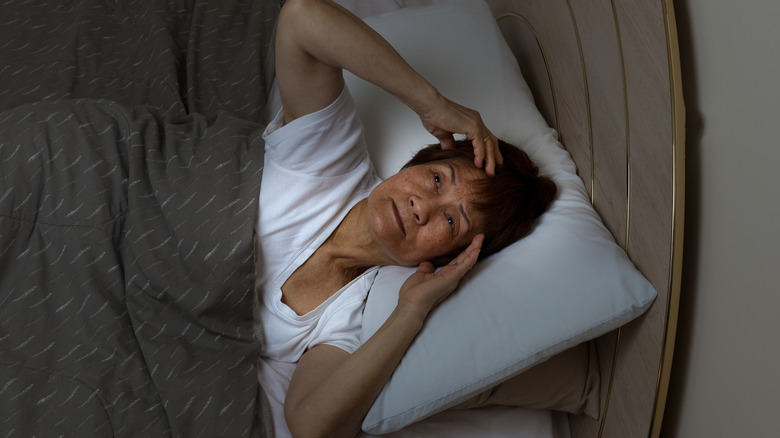
When you’re lying awake at night staring at the ceiling, it can feel like the whole rest of the world is asleep. In fact, there plenty of other people doing the exact same thing. In a study in the medical journal Sleep that tracked the sleeping habits of more than 1,400 people over the course of one year, University of Pennsylvania researchers found that 25% of them experienced acute insomnia at some point. They defined “acute insomnia” as trouble falling asleep or staying asleep for at least three nights per week, lasting for two weeks to three months.
The good news is that in most cases — 75%, that is — the insomnia went away within a year. For the remaining 25% of people, their insomnia came and went, or became an ongoing condition. “Whether caused by stress, illness, medications, or other factors, poor sleep is very common,” study author and professor of psychiatry Michael Perlis said to Penn Medicine News. So, the next time you’re tossing and turning, maybe text a friend? There’s a 25% chance they can’t sleep either.
Ongoing insomnia can bring serious health risks

Daniel M Ernst/Shutterstock
Chronic insomnia can take a toll on your physical health. For one thing, the resulting daytime drowsiness raises the risk of car accidents or other injuries. One study in the medical journal Sleep found that 8% to 9% of unintentional fatal injuries, and up to 34% of fatal car accidents, could be linked to insomnia.
Insomnia seems to affect chronic health conditions as well. An analysis in the European Journal of Preventive Cardiology of 13 previously published research studies found that people who reported symptoms of insomnia were 45% more likely to develop cardiovascular disease, or die from it, in subsequent years compared to people with no problems sleeping. Another study published in Neurology, which defined insomnia more narrowly, found the risk to be lower — 18% for people with multiple insomnia symptoms. But that research also found that the connection between insomnia and cardiovascular disease was stronger in younger adults (under age 50). According to those researchers, lack of sleep may affect hormones, glucose tolerance, blood pressure, and other factors that affect cardiovascular health.
Insomnia may also be a risk factor for type 2 diabetes. This connection was made for the first time in a recent study in Diabetologia that analyzed a large body of published research to identify factors that increase or decrease diabetes risk. Insomnia was found to increase the risk of diabetes by 17%. The researchers noted that lack of sleep can be associated with less healthy eating habits that raise diabetes risk (via Diabetologia).
Insomnia is a huge drag on the economy
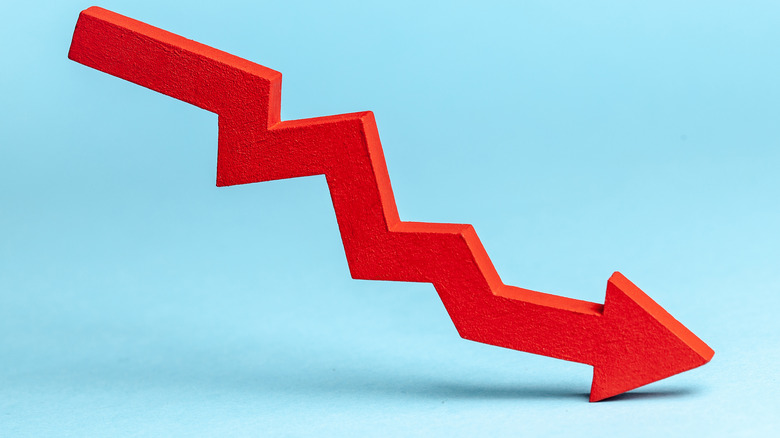
A Dragan/Shutterstock
Could you put a dollar value on getting a good night’s sleep? Maybe not. But one way to measure the effects of insomnia in economic terms is to look at its impact on workplace productivity. With an estimated 50 to 70 million Americans stating that nighttime sleep loss affects their ability to function during the day, it’s easy to see that insomnia could have a widespread influence in the workplace, according to the Institute of Medicine Committee on Sleep Medicine and Research.
Researchers attempted to measure this using data from the American Insomnia Survey, which collected data from a sample of nearly 7,500 members of a national health insurance plan (via Sleep). The survey collected data on insomnia and other health conditions, as well as work performance (sick days, for example) and salary information. It turned out that insomnia wasn’t related to being absent from work, but it was related to “presenteeism” — that is, showing up for work but not being able to work at full capacity. Calculating those lost work hours shows that annually, insomnia causes an average loss of about eight work days per person, and a loss of $2,280 … which multiplies out to insomnia costing U.S. employers $63.2 billion a year.
Chronic insomnia can be a signal of serious mood disorders
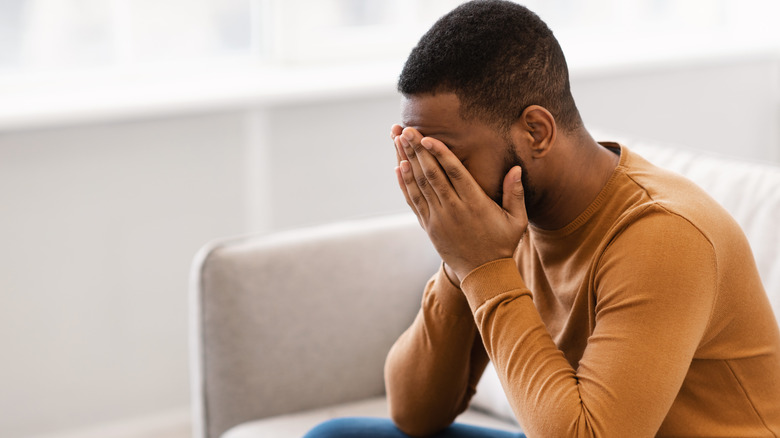
Prostock Studio/Shutterstock
Sleep-related problems like insomnia often occur alongside mood disorders like depression or anxiety, though it’s always not clear whether one leads to the other, according to Psychology Today. But a body of research points to the connection. One study examined health data for over 25,000 people and found that those who had long-term insomnia were more likely to develop an anxiety disorder (via Sleep). Insomnia tended to be present in people with depression, though having insomnia didn’t raise the risk of developing depression over time.
Another study published in Sleep found that children who had insomnia symptoms that persisted into adolescence and adulthood had nearly three times the risk of developing depression, anxiety, or related conditions. Researchers who analyzed data from a survey of nearly 75,000 people found that suicide risk was doubled for people who reported they often had sleeping problems (via Sleep). And Psychology Today recommends talking to your doctor if you have insomnia that lasts two weeks or more, and doesn’t go away or gets worse despite your efforts to get more sleep.
Insomnia can give you nightmares
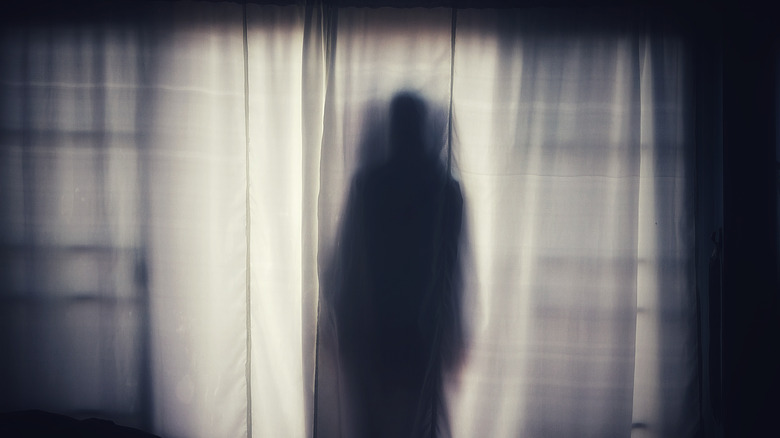
PATSUDA PARAMEE/Shutterstock
Being unable to fall asleep can feel like a nightmare. But as if that wasn’t bad enough, people with insomnia are more likely to have actual nightmares when they do sleep (via Sleep). The connection was documented with data from a national health survey conducted in Finland, which questioned nearly 14,000 adults on various physical and mental health parameters.
Some interesting stats about nightmares: about 2% to 6% of the adult population experiences nightmares once or more per week; they’re more common among children and adolescents, become less common among adults, but increase in frequency again among seniors. Women have them more often than men. In the study, frequent nightmares were reported by 3.9% of the survey responders, but among those who had insomnia, the prevalence was 17%. The only risk factor that was stronger for nightmares was depression. Because other indicators of general well-being such as exhaustion, low life satisfaction, and a negative attitude towards oneself were also associated with nightmares, it could be that having nightmares is a general indicator of psychological or physical health issues. “Our study shows a clear connection between well-being and nightmares,” neuroscientist and lead study author Nils Sandman — yup, that’s really the sleep doctor’s name — told the American Academy of Sleep Medicine.
There are different types of insomnia
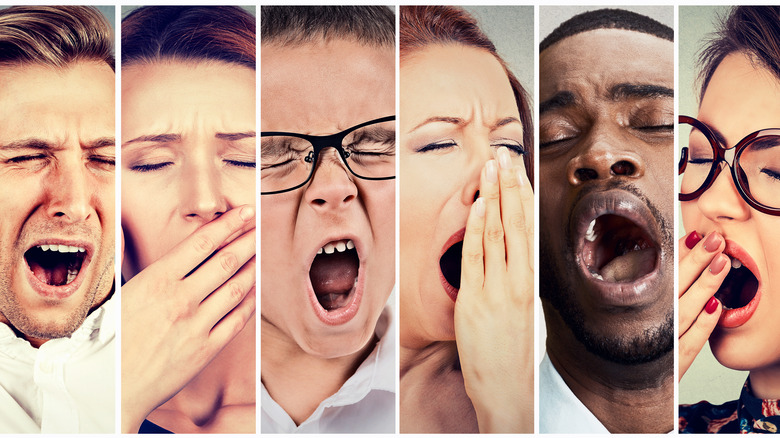
pathdoc/Shutterstock
According to the AASM, sleep scientists classify insomnia as short-term (lasting for three months or less) or chronic (occurring least three times per week and lasting three months or more). You might be able to resolve short-term insomnia by practicing good sleep hygiene. That means keeping to a consistent bedtime and wake time (weekends included), avoiding electronic devices before sleep, and other pro-sleep practices (per AASM). If the trouble lasts more than three months, it’s a good idea to see a sleep specialist.
Beyond those categories, it’s possible that insomnia may one day be diagnosed according to different subtypes. A recent analysis of data from over 2,000 people who completed a health survey suggests that there are five distinct versions of insomnia (via The Lancet). The differences aren’t based on insomnia symptoms, but have to do with personality traits and brain function. For example, type 1 is accompanied by feeling down or tense, while other types experience less distress. Type 4 becomes more severe during stressful life events, while type 5 isn’t affected by stress. “While we have always considered insomnia to be one disorder, it actually represents five different disorders,” the researchers noted in a press release in the Netherlands Institute for Neuroscience. Identifying the insomnia subtype may help doctors choose the most effective treatment. One type might respond better to medication, for example, while another may be more effectively treated with cognitive behavioral therapy.
Some people are more prone to insomnia than others
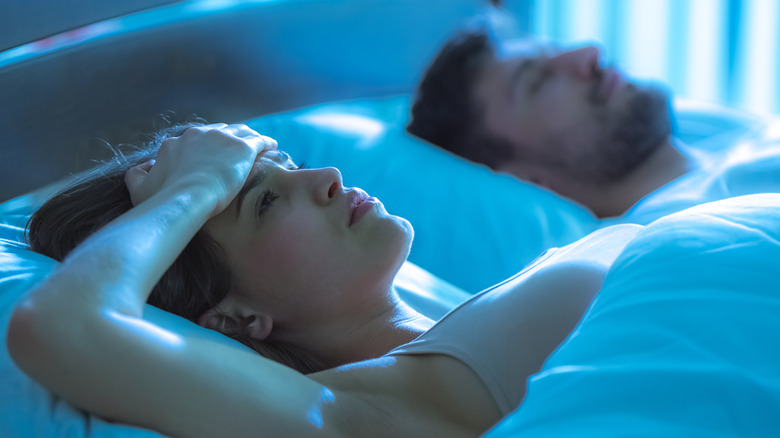
Realstock/Shutterstock
There are many possible causes for insomnia: stress, medical conditions, medication side effects, mental disorders, even environmental conditions or bad habits that make it hard to sleep (via Mayo Clinic). But it seems that at least some people inherit a tendency for insomnia. A hereditary connection to insomnia was first established through studies of twins and families, showing that as much as 45% of its occurrence may be due to genetic factors (via Brain Sciences). One study of 7,500 people found that genetics has a bigger influence on insomnia in women then in men (via Sleep). And scientists are beginning to identify specific genes tied to insomnia (via Nature Genetics). Understanding the genetic basis of insomnia may also help clarify how it’s related to depression and other mood disorders, because some of the same genes seem to be involved. “This is an interesting finding, because these characteristics tend to go hand in hand with sleeplessness. We now know that this is partly due to the shared genetic basis,” neuroscientist Anke Hammerschlag said about her gene-identifying research (via the Netherlands Institute for Neuroscience).
Insomnia is a problem during pregnancy
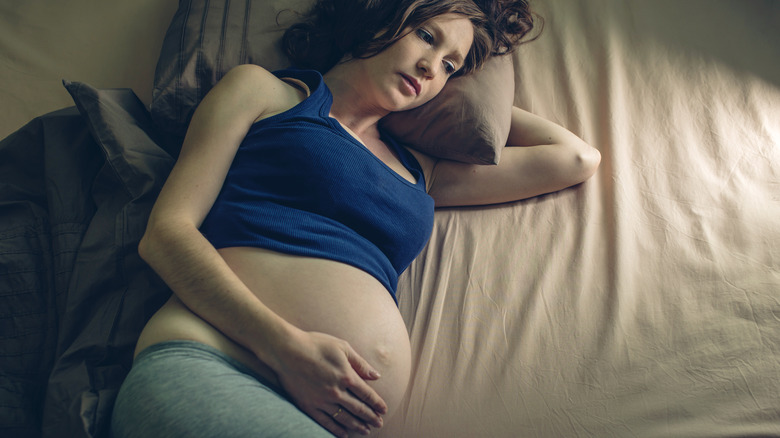
Artem Oleshko/Shutterstock
The hormonal and bodily changes that occur in pregnancy can affect sleep in multiple ways, producing shallower sleep, fragmented sleep, and overall less restful sleep compared to sleep before pregnancy (via European Journal of Obstetrics & Gynecology and Reproductive Biology). But the most common sleep complaint during pregnancy is insomnia, and it may be an underrated problem. In a study that collected data from 486 women during and after pregnancy, 44% reported having insomnia during their first trimester, 46% in the second, and 64% in the third. The severity of the insomnia also increased during the course of the pregnancy. Moderate physical activity decreased insomnia risk.
Insomnia is a risk factor for some pregnancy complications, including hypertension, preeclampsia, gestational diabetes and preterm delivery, the researchers point out, yet it’s not addressed in routine prenatal care. They add that a problem affecting more than half of pregnant women shouldn’t be neglected. Counseling pregnant woman on how to manage insomnia by following sleep hygiene practices could mitigate these health risks, they say.
Refined sugars and carbs could increase your risk

Africa Studio/Shutterstock
Standard advice for handling insomnia includes some dietary recommendations like avoiding big meals, caffeine, and alcohol before bedtime (via Mayo Clinic). But there’s evidence that one’s overall diet can contribute to overall insomnia risk. Researchers documented this using data from over 53,000 women who participated in a diet and health survey, with a follow-up survey three years later (via The American Journal of Clinical Nutrition). The numbers showed that the more starches, refined grains, and added sugars (that is, sugar added to a food as a sweetener) someone ate, the more likely they were to develop insomnia. Conversely, eating more dietary fiber, whole grains, fruit, and vegetables lowered the risk of insomnia.
The reason seems to the high glycemic index (GI) of foods with added sugar and/or low fiber. Foods with a high GI release glucose into the bloodstream quickly, and that spike in blood sugar triggers a hormone response that makes blood sugar drop and can disrupt sleep. It’s also possible, the researchers say, that a high-sugar diet causes an ongoing immune system response that makes it harder to sleep. While these results are suggestive, the study was done in postmenopausal women only; more research will be needed to test the relationship between insomnia and diet in other groups.
Your bed partner could make it worse
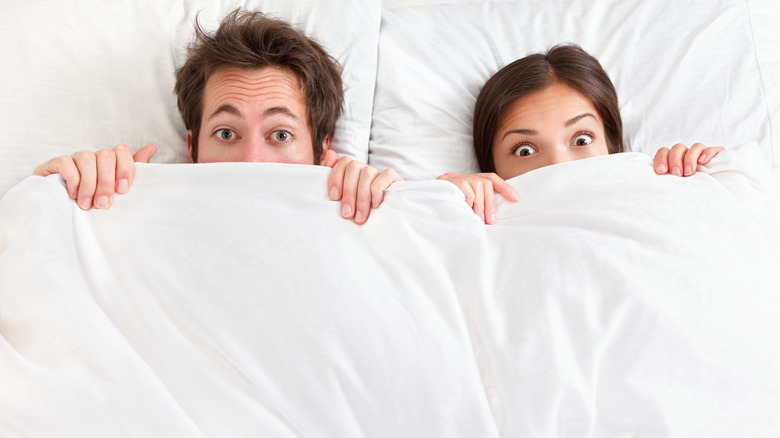
Maridav/Shutterstock
If you have insomnia and don’t sleep alone, it’s possible your significant other is contributing to the problem, and not because they keep elbowing you in the ribs in their sleep (though that probably doesn’t help). There’s evidence that partners of people with insomnia actually make it worse by trying to help (via AASM). A research team interviewed the partners of 31 people who’d come to a sleep center seeking treatment for insomnia. They found that the partners, attempting to be supportive of their sleepless significant others, tended to encourage behaviors that contradicted the standard recommendations for managing insomnia. For example, 74% of the partners encouraged their bedmates to go to bed earlier or sleep later — but keeping to a consistent bedtime and wake time is an important strategy for good sleep. Other examples of bad sleep behavior that was encouraged by partners included taking daytime naps, doing other things in bed like reading or watching TV, and relying on caffeine. The companions also tended to change their own habits to accommodate the insomnia, which raised their anxiety levels even though it made the insomnia patients feel better, the study found.
Cognitive behavioral therapy can help
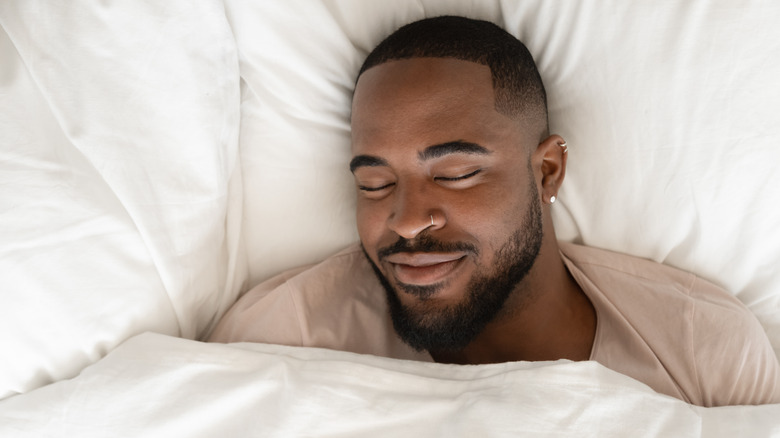
fizkes/Shutterstock
The first-line treatment for insomnia is a structured therapy program called cognitive behavioral therapy for insomnia, or CBT-I (via the Mayo Clinic). Working with a sleep therapist, someone in a CBT-I program learns to recognize beliefs that affect their ability to sleep, and to eliminate negative thoughts that keep them awake. That’s the cognitive aspect of the program. For the behavioral component, the therapist teaches a number of helpful techniques, including improving sleep hygiene, meditation and other relaxation methods, and biofeedback (monitoring things like your muscle tension and heart rate during sleep, and making adjustments if necessary).
One study examined the effects of CBT-I on 455 insomnia patients and found that stress, anxiety, or depression didn’t make CBT-I less effective (via Sleep Medicine). In fact, it helped alleviate those problems as well. Another study found that the therapy produces results in as few as three sessions, and that patients who complete three sessions ended up spending $200 less on healthcare in the following six months, compared to those whose insomnia was untreated (via Pharmacotherapy). According to the American College of Physicians, cognitive behavioral therapy for insomnia is not only effective, it’s likely to be less harmful than sleep medications, which can have serious side effects and shouldn’t be used for long periods of time. CBT-I can even be done over the phone or online.
Try a weighted blanket!
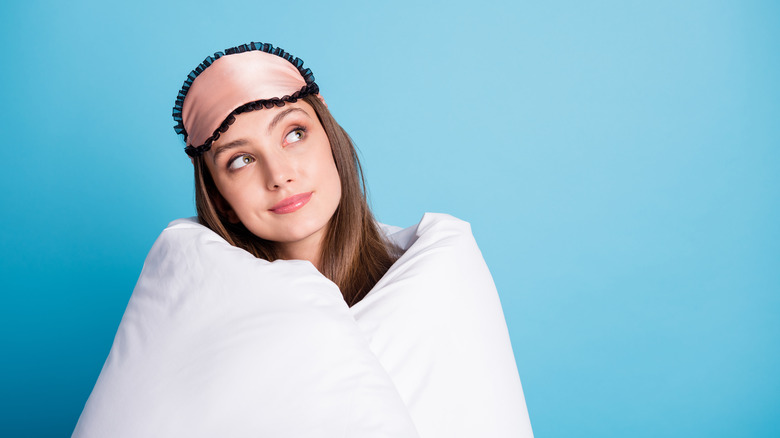
Roman Samborskyi/Shutterstock
Short-term insomnia, lasting less than three months, can often be managed with self-treatment, like improving your sleep hygiene habits (via Healio). You might add “buy a weighted blanket” to that to-do list. A study in which 120 adult insomniacs were given either a 17.6-lb (8 kg) blanket or a 3-lb blanket of the same size and texture found that most (60%) of the heavy-blanket sleepers had improved symptoms after four weeks, compared to 5% of the light-blanket users (via AASM). And when the latter switched to a weighted blanket, they too improved. The pressure of the blanket may have a relaxing, massage-like effect on muscles and joints, psychiatrist and study author Mats Adler told the AASM. The study’s findings are a reminder that the surfaces we’re in contact with – including the mattress, bed clothing, and bedclothes – affect the quality of our sleep, according to a commentary published with the study (via the Journal of Clinical Sleep Medicine).
Here’s an easy self-test to diagnose insomnia
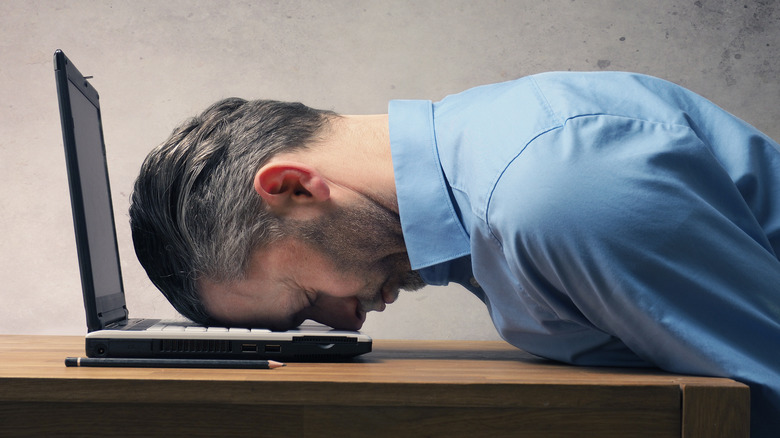
beanimages/Shutterstock
Simply having a night of poor sleep doesn’t mean you have insomnia. On the other hand, as many as 35% of adults experience insomnia at some point according to the American Academy of Sleep Medicine, and you may be one of them. You can assess the situation by asking yourself these four questions:
- Do I need more than 30 minutes to fall asleep at night, or do I wake up during the night and have trouble falling back to sleep, OR do I wake up earlier in the morning than I want to?
- Do I have daytime symptoms due to lack of sleep, like feeling fatigued, low on energy, sleepy, or moody?
- Am I in bed long enough to get at least get at least 7 hours of sleep each night?
- Is my bedroom a dark, safe, quiet, comfortable environment that should enable me to get good sleep?
Answering yes to all four of those questions is an indicator that you may have insomnia, says the AASM. What’s your next move? If your symptoms haven’t lasted more than three months, you can try to reverse the situation by instituting good sleep habits, like following a relaxing ritual before bed. If the problem has been going on longer than that, or you don’t want to wait, talk to your doctor about being evaluated at an accredited sleep center.

